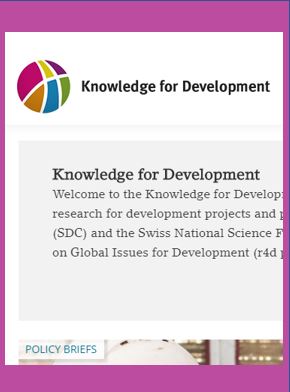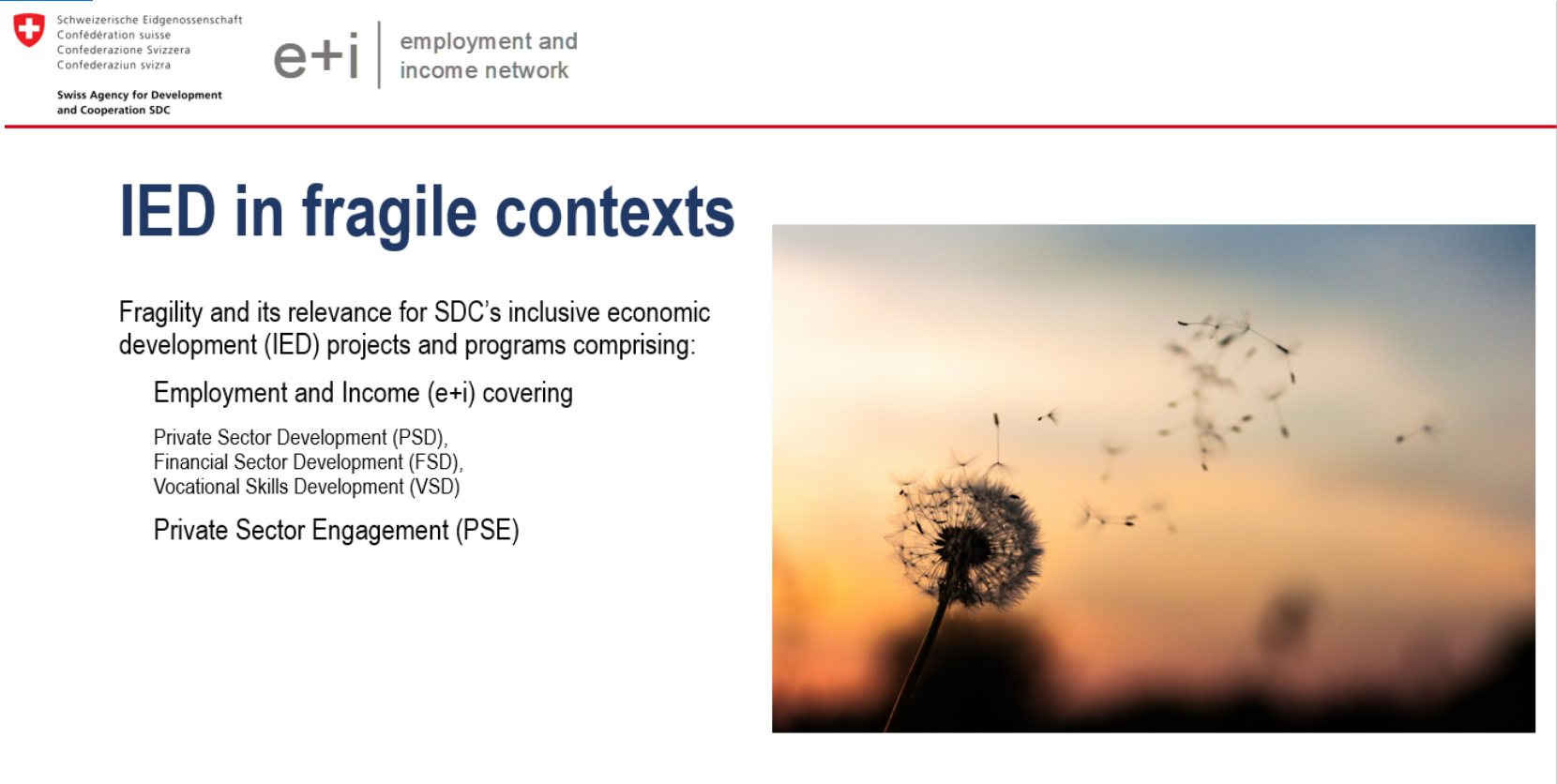Page Content
Home

Page Content
This web-platform is SDC's instrument for the exchange between development practitioners working towards the creation of employment and income. Them being placed all over the world, the common virtual space will allow to document experiences and to exchange on insights gained or on open questions. You can access this closed space by registering yourself for the e+i community area. Find instructions on how to proceed with your registration process
here. The platform provides access to working aids on the following thematic areas within the field of employment and income:
A simple click on one of the thematic areas above leads you to a gateway from where you can access information, resources, experiences, projects and discussions about that topic or start a search related to the given topic. The medium term orientation 2015 - 2019 for the e+i network can be found
here.
If you want to become involved in the e+i community in order to access even more resources (e.g. document database and
project database) start your registration process
here.
Subscribe to the e+i
│EPS network newsletter:
eiMail Besides much more, you will find information to the following topics:
 15 April to 15 April 2021
15 April 2021 to 15 April 2021
15 April
15 April 2021
15 April to 15 April 2021
15 April 2021 to 15 April 2021
15 April
15 April 2021
For all information about this event please go to
 06 April to 06 April 2021
06 April 2021 to 06 April 2021
06 April
06 April 2021
06 April to 06 April 2021
06 April 2021 to 06 April 2021
06 April
06 April 2021
For all information about this event please go to
 19 Mar 2021
[2.2 MB]
SDC’s Financial Sector Development (FSD) experts have carried out a project portfolio analysis for the years 2015–2019, which revealed the central role of FSD as enabler of many different SDGs.One of its results is a project portfolio map that shows project-type interventions with expenditures related to financial sector development in 2019.
 08 Jun 2020
Vocational skills development (VSD) supports individual development and is a powerful tool to integrate migrants and forcibly displaced populations into local economies and societies. The better educated and trained migrants are, the more they can take advantage of the opportunities migration offers and the greater the benefits for both countries of destination as well as countries of origin. Migration and VSD are both important topics of the Dispatch on Switzerland’s International Cooperation 2021-24. This working tool brings the two topics together. It offers a structured analysis process that helps you to better integrate migrants into your VSD programs, or to use VSD as an intervention strategy in migration projects. The tool was developed jointly by the SDC Networks Employment and Income as well as Migration and Development. >> Have a look at the tool!
 16 Mar 2020

At the start of the year 2020, SDC’s cluster for Inclusive Economic Development (IED) has launched new backstopping mandates (BSMs).
What is the purpose of the new backstopping mandates? The backstoppers are going to support the Cluster IED in - Strengthening the e+i network in thematic competences in the three e+i areas Vocational Skills Development, Private Sector Development and Financial Sector Development (e.g. with guidelines on good practices and successful approaches)
- Providing an effective communication on SDC practices towards interested stakeholders, both on e+i topics and the modality of engaging with the private sector
- Fostering knowledge management with innovative instruments (e.g. webinars, eTalks, interactive F2F events, etc.)
- Providing on-demand advisory services (see for some aspects that may be supported in this video)
 Who are the backstoppers? Who are the backstoppers?
HELVETAS Swiss Intercooperation and KEK-CDC Consultants are leading and coordinating the new backstopping mandates together with partners (Border Crossing, Sags, Mesopartner, Hans Posthumus Consultancy, GFA, Mitha Finance, BSS Volkswirtschaftliche Beratung, Gamper Smith Associates, INBAS Institute, Michael Morlok, Swiss Educational Innovation Network SNBI, Zurich University of Teacher Education PHZH). Have a look at the profiles of the thematic backstoppers on Private Sector Development, Financial Sector Development and Vocational Skills Development.
What’s in for you? SDC staff members can benefit from the backstopping teams to get thematic advice, methodological guidance, referral to good practice cases, possibilities for online exchanges and, and, and… regularly receive new insights and event announcements through a quarterly newsletter as you are reading right now!
 23 Oct 2019

[7 kB]
The Swiss Programme for Research on Global Issues for Development (r4d programme), co-financed by SDC and the Swiss National Science Foundation, finances research partnerships between Switzerland and African, Asian and Latin American countries in order to provide policy-makers with scientific and development-relevant knowledge. The r4d programme focuses on five thematic areas: social conflicts, ecosystems, public health, food security and employment.
The latter two areas are of particular relevance for the readers of this newsletter. A dedicated session on the r4d programme took place at the F2F event of the e+i and EPS networks in May 2019 in Solothurn. In October 2019, the r4d program launched its new Knowledge for Development platform. It portrays evidence-based research information tailor-made for an interested public and professionals in the field of sustainable development cooperation. A filter function helps you to find easily the content of your interests. The platform will be constantly growing and fed with new outputs from the r4d projects and r4d syntheses are published throughout the next years. We invite you to visit the platform - a contribution to transformative knowledge societies taking forward sustainable development at local, regional and global scales.
 26 Apr 2017
[927 kB]
Back in 2004, the SDC published the first version of Mobilising savings– Key Issues and Good Practices in Promoting Savings. The document provided an overview of the needs and demands of low-income households for savings services, as well as savings mobilisation from the perspective of a financial institution and the regulatory financial authorities in developing and transition countries. It was conceived as a tool for SDC staff and partners as well as for all other persons involved in the promotion of savings services by financial institutions.
This publication was updated in 2018, showing the progress of the topic since 2004, providing a deeper insight on new trends and highlighting once again the importance of mobilising savings. The Savings & Credit Forum on formal saving services held in September 2017 also revived the discussion on savings, from which insights fed into this document.
The below versions in Spanish and French are still the ones from 2004.
 18 Feb 2021
[50.4 MB]
Andrea Inglin, Senior Advisor VSD at the e+i Focal Point summarizes some key findings of the slide deck on PSE in VSD, in an interview with Roman Troxler, co-author of the slide deck. Have a look at the video!
 08 Feb 2021
[87 kB]
The PROMOST (Promoting Market Oriented Skills and Trainings) project supports the Governments of Rwanda, Burundi and the Democratic Republic of Congo (DRC) to improve access, quality and relevance of their respective Technical and Vocational Education and Training (TVET) systems and is currently in its third implementation phase. Within PROMOST, the Private Sector provides the professional teachers «Maitres Artisans Formateurs» (MAF), a contribution to the consultation process on a VSD based PPP-system as well as opportunities for apprenticeships and jobs.
 08 Feb 2021
[1 MB]
At the end of 2019 Nestle and SDC initiated and jointly fund and steer a project that strengthens INFOCAL Santa Cruz, a private non-profit centre created by the National Enterprise Chamber of Bolivia.
 04 Feb 2021
[1.4 MB]
In late 2020 the e+i backstopping team has developed a comprehensive slide deck on Private Sector Engagment (PSE) in VSD. This slide deck elaborates on the different levels of collaboration with the private sector on system level and within PSE projects – and it presents lessons learned from 14 of our VSD projects. The slide deck will be presented in a global webinar on 16th March 2021 (invitations will be sent out mid-Februrary). Further presentations/Q&A sessions in the context e.g. of regional exchange events or team meetings are warmly encouraged and the e+i focal point and backstoppers are ready to support you.
 08 Dec 2020
[1.5 MB]
SDC’s IED Cluster developed a slide deck that aims at providing support and guidance to e+i and PSE projects working in fragile contexts. The slide deck fosters a common understanding on fragility and its relevance for SDC’s PSD, FSD, VSD and PSE projects. The documents is complemented with examples of best practices in fragile contexts. Please also have a look at the Frequently asked questions (FAQ) below, they complement the Slide Deck:
 30 Nov 2020

please click once more and visit this site, thank you!
 13 Oct 2020
The overview paper (16 pages, May 2020) explores how to develop a system change strategy and intervention plans that lay the groundwork for system change assessment, including how to set system boundaries and how to identify the system changes a programme aims to catalyse; and assess system changes using both (i) an intervention lens focused on changes introduced by specific interventions, and (ii) a helicopter lens that provides a whole system view. In April 2020 a webinar where the four authors provided an overview and answered burning questions was attended by 166 practitioners. Following the webinar the authors published a paper that explains in detail how to implement this pragmatic approach with worked examples and useful tips: A pragmatic approach to assessing system change: How to put it into practice (91 pages).
Overview paper (16 pages) How to put it into practice (91 pages) Webinar (April 2020)
 28 Aug 2020
 21 Aug 2020
[5 kB]
Provides a brief overview of impacts and responses related to women’s economic empowerment to Covid-19 by governments, donors, the private sector and civil society, highlighting early examples of evidence, practices, and key issues for consideration.
 12 Aug 2020
[5 kB]
Recording of the presentation of the ICT4VET Covid-19 CoP Kick-off: overview of design and implementation aspects
 23 Jul 2020
[294 kB]
Meet the Swiss Agency for Development and Cooperation’s thematic focal point for employment and income and discuss with peers on SDCs’ engagement in vocational skills development!
 22 Jul 2020
[1.1 MB]
Presentation with examples from Switzerland
 22 Jul 2020
[978 kB]
Have a look at the example mentioned by PPSE Kosovo (implemented by Swisscontact).
 22 Jul 2020
[241 kB]
Read the short summary paper of the topics raised during the exchange event, with links by Adrien and by the participants.
 27 August to 27 August 2020
27 August 2020 to 27 August 2020
27 August
27 August 2020
27 August to 27 August 2020
27 August 2020 to 27 August 2020
27 August
27 August 2020
Meet the Swiss Agency for Development and Cooperation’s (SDC) thematic focal point for employment and income and discuss with peers on SDCs’ engagement in vocational skills development! Interested in participating? >> Please register here. We are thrilled to meeting you virtually and kick-start mutual learning! The VSD team of SDC’s employment and income focal point
 05 October to 31 October 2020 in online
05 October 2020 to 31 October 2020
05 October in online
05 October to 31 October 2020 in online
05 October 2020 to 31 October 2020
05 October in online
This course will introduce the core concepts of market systems development and provide simple, practical tips to enable you to implement them in your context. The course is made to be delivered online, so you can learn alongside your normal working week. For more information see here.
 05 October to 31 October 2020 in Online
05 October 2020 to 31 October 2020
05 October in Online
05 October to 31 October 2020 in Online
05 October 2020 to 31 October 2020
05 October in Online
This course, organized by DevLern, shows you how to measure and use results using the DCED Standard for Results Measurement. The course is delivered through videos, guided exercises, and group discussions, and can be completed alongside your normal working week. For more information see here.
 28 September to 09 October 2020 in online
28 September 2020 to 09 October 2020
28 September in online
28 September to 09 October 2020 in online
28 September 2020 to 09 October 2020
28 September in online
This course, facilitated by Hans Posthumus and Phitcha Wanitphon, will draw on the DCED Standard for Results Measurement and will be conducted live over 10 half-day sessions – including short presentations, exercises, real-life cases, break out groups, discussions, and debates in an online environment. For more information see here.
International Cooperation Strategy & Education
|
